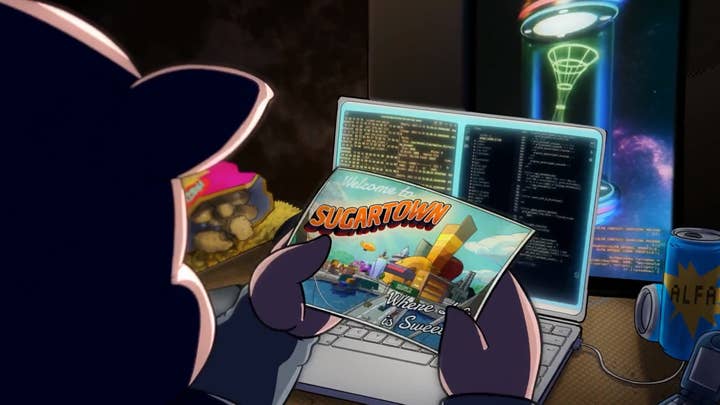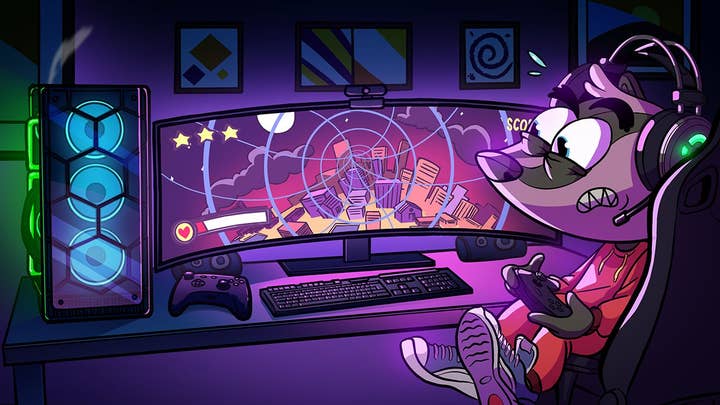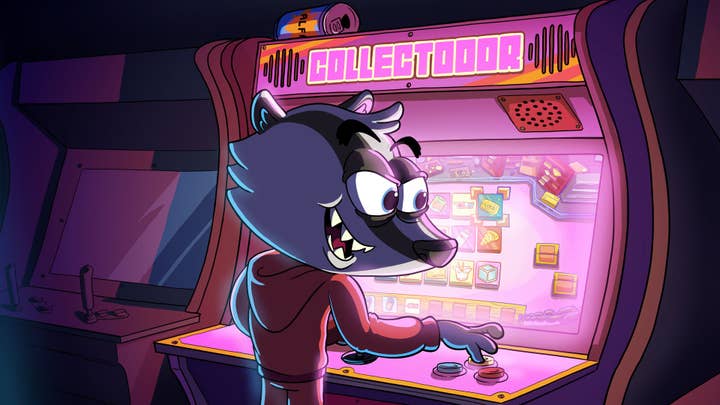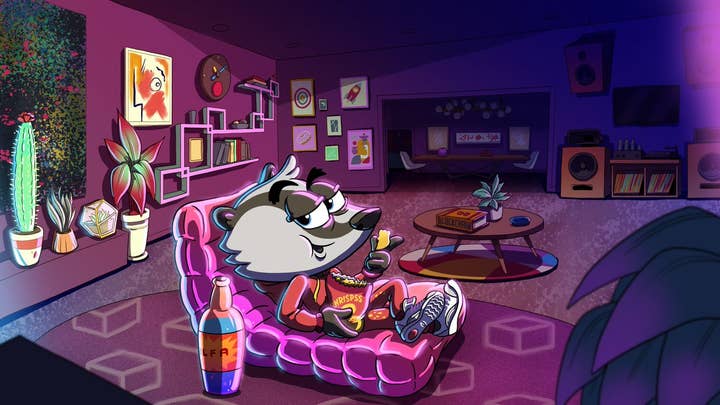Blockchain gaming forgotten, but not yet gone | This Week in Business
There's a lot less buzz around blockchain gaming these days, but Zynga's new Web3 title reminds us it's not quite dead yet
This Week in Business is our weekly recap column, a collection of stats and quotes from recent stories presented with a dash of opinion (sometimes more than a dash) and intended to shed light on various trends. Check back every Friday for a new entry.
Remember blockchain gaming? It's been almost exactly a year since we last focused on it in this space.
I hope you enjoyed that time off, because it's time to talk about it again as Zynga finally gave us the first peek at what its blockchain division has been doing for the past two years.
QUOTE | "Zynga has always been on the forefront of innovation, and with Sugartown, our ambition is to empower players through a sustainable Web3 platform full of fun and enduring games." – Zynga VP of Web3 Matt Wolf touts the company's first blockchain in an announcement this week.
First of all, the innovation Zynga was on the forefront of in its early years was commonly known as "stealing stuff."
QUOTE | "I don't fucking want innovation. You're not smarter than your competitor. Just copy what they do and do it until you get their numbers." – Zynga founder and CEO Mark Pincus speaking with staff, according to a source for a 2010 SF Weekly article that described Zynga as "one of the most evil places I've run into."
Second, it took two years to come up with a game where players need to own a cryptocurrency token to play, and mechanics revolving around those tokens will provide in-game currency that VentureBeat says is "used to unlock exciting rewards."
Personally, I don't think spending real money to buy fake money for a game that gives you even faker money to spend in the game qualifies as "exciting," but to each their own, I guess.
As for the game itself, the teaser trailer for Sugartown makes it look like an incredibly potent distillation of blockchain bro stereotypes.
Cartoon animals engaged in unsavory activities (car theft, property destruction, computer programming), hard at work while all the other animals are wasting time sleeping, leave behind the farm and its metaphorical sheep (literal pigs and cows) to drive a car with a blower sticking out the hood in the big city, where a badger wearing a suit and Bluetooth headset is checking stock prices on his smartphone when he notices his smartwatch acting up because some ghostly phantoms are messing with the town's electronics.
Thinking about the target audience for such an ad makes me actually feel a little bad for them. And that's coming from someone who was ready to joke that this was their favorite book, even though they would insist it was actually Sun Tzu's Art of War.
It's appropriate that this blockchain marketing is incredibly vague as to key details like what the actual experience of playing Sugartown is, why blockchain is needed to deliver that experience, or when people will be able to play it.
The only thing it's really communicating is a grabbag of Web3 signifiers like hustle culture, tech worship, wealth, cartoons that aren't for kids, and humor as tired as it is obnoxious (the pig has been eating pork rinds, sigh). Even for a teaser trailer, this thing is light on specifics, and there's nothing here to differentiate this from the dozens of other detail-free Web3 hype-building efforts and scams we've seen in recent years, other than Zynga's good name Zynga's name.

To me, the most interesting part of Sugartown (not a difficult competition to win) is the name. It's referenced in the teaser, where a postcard for Sugartown proclaims "Life is Sweet" and carries the message "LFG!" on the reverse.
That promise of a sweet life seems particularly resonant with Web3 advocates, where WAGMI (We're All Going to Make It) is a sort of rallying cry to reassure each other that by being early adopters of this particular pyramid scheme, their investments will skyrocket and they will be rewarded with amazing wealth and admiration from all around them for their shrewd insight and business acumen, and they won't have to worry about the crushing weight of material needs and a precarious future that many are slowly suffocating under every day. Fortune favors the brave, as Matt Damon used to say.
That promise fits quite nicely with the opening verse of Sugartown's possible namesake, Nancy Sinatra's mid-'60s hit Sugar Town.
QUOTE | "I got some troubles, but they won't last
I'm gonna lay right down here in the grass
And pretty soon, all my troubles will pass
'Cause I'm in shoo-shoo-shoo, shoo-shoo-shoo
Shoo-shoo, shoo-shoo, shoo-shoo, Sugar Town"
Appealing as that might be some days, the sentiment sours when you hit the second verse and it becomes a bit more clear the song is about escaping a sad life through LSD-laced sugar cubes.
QUOTE | "I never had a dog that liked me some
Never had a friend or wanted one
So I just lay back and laugh at the sun
'Cause I'm in shoo-shoo-shoo, shoo-shoo-shoo
Shoo-shoo, shoo-shoo, shoo-shoo, Sugar Town"
But for me, the more appropriate musical namesake for the game might be the final lines of Bob Dylan's song Trying To Get To Heaven.
QUOTE | "Gonna sleep down in the parlor,
And relive my dreams
I close my eyes and I wonder
If everything is as hollow as it seems.
"Some trains don't pull no gamblers
No midnight ramblers like they did before
I've been to Sugar Town, I shook the sugar down
Now I'm trying to get to heaven before they close the door"
It's a fitting dirge for the last wave of crypto hustlers, a group of people who bought into the gold rush a few years ago and find themselves playing out the string in the hopes that their moonshot investments can mount a last-second comeback before the window of opportunity slams shut for good.

And in a lot of ways, it feels like that might be called for. The enthusiasm for NFTs and Web3 integration as the Next Big Thing has cooled off a bit, right alongside metaverse mania. It makes sense those two trends would ebb and flow together what with their shared goal of commodifying every aspect of human existence.
Right now, all the oxygen in the Next Big Thing room is being taken up by Generative AI. Replace oxygen with "model glue fumes," room with "garage," and "taken up" with "huffed" as you see fit.
The VC money for blockchain has also dried up this year and the big tech companies have talked about tightening the belt as they played duelin' layoffs to the tune of 10,000 people each.
We checked with Digital Development Management (DDM), a firm that puts together quarterly round-ups of investments in gaming, to see how blockchain gaming investments were doing this year.
QUOTE | "Since the start of the crypto-winter, we have seen a complete collapse of interest in starting new blockchain games and we have also seen a significant number of Web3 games pivoting to resell themselves as Web2. That said, Epic games is allowing blockchain games in their store and we're starting to see them trickle in. We track all newly announced funds, and we continue to see Web3 funds in the mix, though at a much slower pace, and it seems that nearly all of them focus on the tools and technology underpinnings of Web3 infrastructure instead of on gaming content." - DDM president Joe Minton's view lines up with the anecdotal evidence of a downturn of interest in blockchain gaming.
The overall crypto market has taken a series of body blows, with the head of what used to be the third largest crypto exchange in jail awaiting his fraud trial, and the top two exchanges facing charges from the Securities and Exchange Commission for operating as illegal unregistered securities exchanges.
That cascaded into the gaming world, as GameStop dumped its cryptocurrency wallet support earlier this month, citing "regulatory uncertainty" as its reason.
Just yesterday, NFT trading platform OpenSea even announced that it would make the creator's cut of any transaction entirely optional, even though that passive income for people whose work was popular enough to trade hands or command high prices was one of the key "benefits" NFTs were supposed to provide in the first place.
Between that and the well-established fiction that is digital ownership, the question is no longer, "What can blockchain do for games that could not be done without it?" but "What basic functionalities of blockchain can it reliably do?"
Beyond that, early crypto-curious developer Sega has written-off play-to-earn games as boring, saying it would limit NFTs to lesser franchises instead of heavy hitters like Sonic the Hedgehog and Yakuza/Like A Dragon.
I find it deeply entertaining that Yakuza lets players frequent hostess clubs as a mob enforcer when they're not getting into drunken street fights, but there's no doubt that an association with NFTs would clearly hurt its reputation more than that of NFTs.
"As eager as I might be to talk about blockchain in the past tense, the past year has also seen some significant wins for Web3"
The problem is that as eager as I might be to talk about blockchain in the past tense, the past year has also seen some significant wins for Web3.
No, not when it comes to proving it's a useful technology with relevant gaming applications. Don't be silly.
But blockchain gaming cleared two significant obstacles in the past year when Apple laid out App Store guidelines for NFT and cryptocurrency apps last October and Google approved the use of NFTs in Google Play apps last month. Blockchain developers having clear rules and assurances that they can access the default distribution methods for the largest gaming platforms on earth is essentially a prerequisite for blockchain gaming to take off, and now they have that.
China's ban on cryptocurrency trading for retail investors also looks to be softening, as Hong Kong in June began accepting applications for licenses to run crypto exchanges and trading platforms in the territory.
And as much as the buzz around blockchain gaming has grown quieter after the failure of Ubisoft's Wolf Enhanced Pants and its associated (and richly deserved) mockery, it wasn't so crushing a defeat as to have Ubisoft swearing off the idea entirely.
In June, Ubisoft announced Champions Tactics: Grimoria Chronicles, "a brand new PVP Tactical RPG experimental game" with an as-yet unspecified blockchain component.
And earlier this year, CCP closed a $40 million funding round to make a AAA blockchain game. Although given the Eve Online maker has been struggling to make a second successful game for many years now, I'm not terribly optimistic it will happen with the developers having one hand blockchained behind their back.
These announcements have been met with some derision, certainly, but they haven't prompted the same volume of pushback we had seen with previous blockchain overtures from the traditional gaming market. And I suspect that's largely down to a change in tactics.

QUOTE | "We want to use our infrastructure, our intellectual property, and our assets that we have internally to make sure we have a speed advantage to go into NFT and blockchain gaming." – Zynga president Bernard Kim in 2021, strongly implying that the plan was to use its existing brands with its first blockchain titles.
Sugartown might center on farm animals, but it is clearly not Farmville.
And I will be using "Wolf Enhanced Pants" as shorthand for publisher foolishness for years to come, but I would struggle to tell you the name of Ubisoft's new blockchain game even though I just wrote it a few paragraphs above. It has a subtitle with strong Square Enix vibes, I think? But one of their low-effort generic subtitles, not like a gloriously baffling Kingdom Hearts one.
And Sega's continued use of NFTs with series like Virtua Fighter is distressing, yes, but not as acutely painful for long-time fans as the company classifying Virtua Fighter as one of its "lesser known" franchises.
These companies have realized the traditional gaming earth is salted as far as blockchain goes. But there remains a significant audience of people interested in all things Web3, and they could be reached on their own terms, instead of going through the brands and channels traditional gamers already know and use.
"The traditional gaming earth is salted as far as blockchain goes. But there remains a significant audience of people interested in all things Web3"
That audience has also proven to be surprisingly durable over the years, with no number of rug pulls, scams, and frauds sufficient to change their appraisal of the field and the people who participate in it.
Perhaps it's too painful to admit they were wrong. Perhaps they have too much money tied up in it to walk away at this point. Perhaps they just love getting wrapped up in the excitement of hanging out with their fellow temporarily embarrassed millionaires, which is at least social and genuinely seems to be a cornerstone of Web3 culture.
QUOTE | "Web3 gaming is all about commitment. I'm a true believer, are you?" – In a social media post from June (emphasis in original), Zynga VP of Web3 Matt Wolf reminds us that "culture" and "cult" share the same etymological root.
It (still) doesn't look like blockchain gaming will ever amount to anything, but it's not quite dead yet. And while publishers have realized they can escape some of the backlash by not using their established franchises, creating new games instead of tarnishing existing ones doesn't address the primary reasons it will fail – the technology adds hassles and expenses with no real benefit to the game – nor the reasons it should fail.
In fact, "blockchain sullies our favorite franchises" was nowhere to be found in the list of objections we stated on this website more than two years ago in taking a public stance against the trend. And even though blockchain gaming outfits have had all that time to address those concerns – concerns we were by no means the only people voicing – they have failed to do so.
It's tempting to write an obituary for blockchain gaming, because there's no logical reason to think it's any better positioned to thrive now than it has been at any point in the numerous years people in gaming have been talking about this. But given how much of the world these days defies logic, it might be premature.
True believers won't be able to create a reality distortion field strong enough to change lead into gold, but they are surprisingly good at extending the time it takes for people to give up on the idea for good.
Just look at GameStop's share price for evidence of that. It's been two-and-a-half years since the crest of the short squeeze that was the rational reason for the stock's escalation. GameStop shares have declined significantly since then, but are still trading above their pre-2021 peak, even though the prospects of a brick-and-mortar retailer in an increasingly digital industry have only grown dimmer as the industry increasingly turns to platforms without physical media and sells its wares directly to consumers.
Since Zynga's Sugartown is what set me on a Bob Dylan binge this week, it seems appropriate to close with another of his lyrics. Let's try some on for size.
QUOTE | "And I hope that you die
And your death will come soon
I'll follow your casket
On a pale afternoon
And I'll watch while you're lowered
Down to your deathbed.
And I'll stand over your grave
'Til I'm sure that you're dead."
Oh wow, Masters of War is a lot, huh? But I'm not sure that really captures my attitude accurately here. For one thing, my pale afternoons are far too busy to squeeze in much casket-watching time.
Let's tone it down a bit then, something directed at blockchain believers instead of the tech itself, perhaps? Maybe Positively 4th Street has something that could work.
QUOTE | "No, I do not feel that good
When I see the heartbreaks you embrace
If I was a master thief
Perhaps I'd rob them
"And now I know you're dissatisfied
With your position and your place
Don't you understand
It's not my problem"
Better, but still not quite there. Let's keep it simple and go with one of Trying to Get to Heaven's album-mates instead, Not Dark Yet.
QUOTE | "It's not dark yet, but it's getting there."
The rest of the week in review
STAT | 8 – The number of strikes someone has to have on their Xbox player profile for violating community standards before they get a one-year ban from multiplayer and voice communication under Microsoft's new enforcement system.
You know, if I'm a paying customer at a restaurant who goes around defecating on other customers' tables, I am probably going to catch more than a one-year ban, and I'll catch it a lot sooner than the eighth time it happens.
Now it's possible to get multiple strikes in a single violation depending on how severe that violation is, but strikes are also wiped from the user's profile after six months, or about 180 days.
STAT | 107 days - The total suspensions a user could serve for getting seven strikes, so if you're aiming to catch that year-long ban, make sure you're committing repeat offenses as soon as you're reinstated, or your earlier strikes could easily get wiped out before the time you land number eight.
STAT | 0.33% - The percentage of Xbox users who have multiple enforcement actions against them.
Given that so few people ever become repeat offenders, it really seems like implementing a "three strikes (of any kind) and you're out" policy would make more sense, especially since Microsoft is letting people appeal strikes and expunging them from the record so quickly.
I don't know why companies bend over backwards to keep a handful of toxic players around. Many of them are paying customers, obviously, but so are the people they drive away.
STAT | 27% - The percentage of US players who reported quitting certain games because of disruptive player behavior in an Anti-Defamation League survey from 2021.
QUOTE | "There are tons of things you can do to make a competitive game community less toxic, but ultimately the mechanics of the game and the genre leave you in a state where no amount of Band-Aids can cause that to be a non-antagonistic social system. Competitive games are not designed to create pro-social relationships between players. They are in many ways designed to create the opposite." – Treehouse Games chief product officer Andrea Sepenzis explains why the studio founded by ex-Riot developers is working on a purely co-operative survival crafting game.
Ok, this is supposed to be a round-up of the rest of the industry news so let's switch topics.
QUOTE | "In our communities, we need to start promoting things that can make you sustainable in your career and as an entrepreneur. I [believe in] spreading the message; if you love games and feel like this is your industry, there are multiple ways to get in, and it's not impossible." – Black Voices in Gaming co-founder Justin Woodward talks about the ideas behind the 2023 XPerience Excellence Accelerator.
QUOTE | "While we've decided not to appeal this narrow decision, which has no broader legal impact beyond this individual claim, we are confident that our games do not constitute gambling and that we are in full compliance with local laws." – EA says it won't appeal a judge's order that it and Sony pay €10,800 ($11,800) to children who played FIFA because FIFA Ultimate Team loot boxes violated gambling laws.
While a number of similar decisions in courts around the world have been appealed and eventually went in EA's favor, it's probably concerning for the publisher how often judges looking at Ultimate Team determine that it really is just gambling.
QUOTE | "Level design was kind of a new thing for them. Their pipeline throughout The Witcher development process was that environment artists would build all the space, and then quest designers would script it." - Max Pears, former senior level designer at developer CD Projekt Red, talks about the level design process for Cyberpunk 2077 and makes me feel very sad for level designers.
QUOTE | "When leadership is, say, getting frustrated at you for writing about Tears of the Kingdom after it release, I do think there's a limit to how much things can flourish." – Now-former Kotaku editor-in-chief Patricia Hernandez was clearly frustrated with management at the site's parent G/O Media.
STAT | 1,220 – Exhibitors set to participate in Gamescom 2023 next week, the most the event has ever had.
STAT | 18 and a half years – The expected lifespan of the Xbox 360 Marketplace, as Microsoft announced it will be shutting down the Xbox 360's online storefront in July of 2024. Previously purchased games will still be downloadable and playable on an Xbox 360, but movies and TV content purchased on the system will no longer be viewable because the digital future has obliterated all notion of actual ownership.

